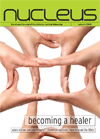The moral status of the embryo
Editor,
Issues concerning the fetus have been around for a long time but scientific interest in stem cells is more recent. One important question is whether the embryo has a soul. Here I agree with Peter Saunders. The author has indicated that an 'eternal soul' is a Greek philosophical postulate originating in the days of Plato and Aristotle, around the fifth century BC. It isn't a scriptural concept.
In-depth public discussion on the status of the embryo becomes imperative if we are to be involved in charting humanity's common future. I believe the ethics of human embryonic stem cell research and gamete selection concerns personhood. Acquiring the status of personhood implies having a functioning body, being able to make decisions, having the capacity to relate to others, having an aesthetic sense, and is dependent on our brain being able to appreciate the world, love, pray and believe.
At some stage of human development personhood appears but this attribute doesn't belong to either the early fetus or the embryo. This view is supported by the Constitution of the United States of America, where in 1973 the Supreme Court ruled that the blastula, embryo and fetus did not qualify as a 'person' and, for legal purposes Justices need not decide when life begins. This allows openness in approaching embryonic research and gamete selection because embryos in a Petri dish have no legal status.
What defines 'human life' as used by Peter Saunders? Human life at this early stage is dependent on a nurturing womb and hence an embryo in vitro does not meet any special criteria. Gamete selection where familial diseases such as fibrocystic disease, haemophilia and Huntington's chorea occur may allow parents with the affected genome to have a normal child with the genetic abnormality eliminated. Although Saunders expresses a degree of anguish concerning the embryos eliminated some opposed to this procedure have not had to care for families with affected children.
Stem cells do not develop into embryos. Even should an alternate source of stem cells be identified, human embryonic stem cell research is needed now. The view expressed in this article by Saunders will not permit this possibly beneficial advance in medical science. There are many suffering people who live in the hope that these potential results of research may meet their clinical needs.
The un-needed embryos produced by the modern birth technologies are at present doomed to be wasted. My plea is to stop and consider, and to do everything we can to improve the quality of the lives of people around us. As those bearing the image of God and as stewards of his creation let us use our skills in a responsible manner.
KNP Mickleson
Epsom, New Zealand
Author's reply
Editor,
Ken Mickelson argues that members of the species homo sapiens can be divided into persons to whom we owe moral responsibility and non-persons that we can treat as a means to an end. He makes this distinction on neurological criteria. He then argues that the destruction of embryos carrying genetic diseases and the cannibalisation of embryos to produce embryonic stem cells for research are justified because embryos are not persons. I have the following problems with this view:
First, his criteria seem to exclude from 'personhood', not only embryos and fetuses, but also many other vulnerable members of our species. Can babies make decisions? Do people in a coma have the capacity to relate to others? Do people with profound dementia love, pray and believe?
Second, he conflates legal and moral status. The fact that the (amended) Constitution of the USA regards embryos and fetuses as non-persons does not mean that they are non-persons. Under the same constitution it was once decreed that African slaves were non-persons. Legality and morality are not equivalent.
Third, does the fact that an embryo is 'dependent' on a nurturing womb, really mean that it has less value than other human lives? Are not all human beings to some extent dependent on other human beings for their continued existence?
Fourth, although it can be very difficult to look after a child with special needs, does this mean that it is justifiable to kill that same individual at the embryonic stage? Mickelson seems to think so, but why could not similar arguments be used to justify abortion, infanticide or euthanasia for older disabled individuals who impose a similar burden on their families?
Fifth, he argues that since excess human embryos are to be destroyed anyway, it is justifiable to use them in destructive research. But didn't doctors in 1940s Germany use the same argument to justify destructive research on Gypsies, Slavs, Jews and homosexuals? We cannot take the life of a human being on the basis that it is going to die anyway. Surely it is better not to create excess embryos in the first place.
Finally, the key issue here is whether the value of a human life is dependent on its neurological capacity. I would submit that it is not. The Bible teaches that human lives have value because they are made in the image of God. I would therefore argue that we shouldn't discriminate against embryos on the basis of their age, size, location, degree of dependence or neurological function but rather treat them as neighbours worthy of respect, wonder, empathy and protection. Or at the very least, give them the benefit of the doubt.
Peter Saunders
CMF general secretary































